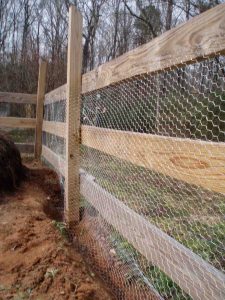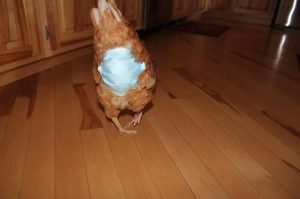One thing about having chickens – not the rotisserie kind – is that if you want to keep them, you’ll need to protect them. Because we’re not the only critters who think chicken is delicious!
The last time I raised chickens I lost a bunch of them – to critters that dug under the fenced-in chicken run I’d built. I didn’t know – then – about the importance of burying the fence several inches, in order to thwart the critters looking for a chicken dinner. I know better now. And if you’re reading this before you get chickens . . . now you do, too.
My run consists of a three-sided square of fencing and posts – the fourth side being the back wall of my shed, onto which I have built the coop. The posts are set about four feet apart and four feet deep. In between each post is a trench about six inches deep. Into this trench I set the fence – which is made of fairly thick-gauge steel wire; you can buy this stuff in rolls at places like Tractor Supply, Rural King and so on. Then I poured a bead of concrete into the trench.
This anchors the fence into the ground and makes it very hard for critters to get under and into the yard. I also poured a pad of concrete under the swing fence entrance to the coop, leaving less than 2 inches of gap between the bottom of the swing fence and the concrete pad – also done to make it difficult for a critter to have dinner.
My fence will protect the birds from stray dogs, coyotes and foxes. Only a bear or a two-legged varmint of another sort will be able to get through it. And I may run a hot wire along the top of it, to prevent anything capable of it from crawling over it.
But this is only leg of the defensive triad – to borrow a Cold War term.
There is also death from above to consider. Hawks love chicken, too. And possibly also ducks. Birds eat birds – and often the only sign you’ll find of your bird is a pile of feathers on the ground, marking the place where the hawk picked-up its dinner.
This can be dealt with in two ways. Put a net over the top of your run. A plastic owl on a fence post also works surprisingly well. Hawks are smart but can be fooled by these. Owls are fearsome birds. Even hawks fear owls. Get a big (plastic) owl. Also available at places like Tractor store and Rural King.
The third way – which is a mixed bag way – is to not free range your birds. If you keep them in the run, you are more likely to keep your birds. But, if you don’t free range them, you won’t get the benefit of eggs produced by free range birds that eat the natural things chickens are supposed to eat. Having been there/done that I can attest that free-range eggs – from really free range chickens that have the run of a large yard or field – are much better-tasting than eggs from birds that have free range . . . of their run/enclosure.
Really free-ranging is also better for the birds because it’s cleaner outside of their run than in it and they can find shade and so on more readily. Plus they are also probably happier, and that’s a reasonable thing to take into account when caring for any animal.
But, you may and probably will lose a bird every now and then to predators. This is however natural and part of life. Arguably, it is very much the same as going outside of your house – and not shunning other people – out of fear that someone might sneeze in your vicinity.
It’s possible you might get sick. But it’s certain you won’t be living much if you “shelter in place” and treat yourself and others as suppurating lepers.
Back to the birds – and preserving them.
You will also want a secure coop – one that only you can get into. This means a door with a lock that critters without opposable thumbs cannot open. Windows with heavy mesh wiring (use scrap from the fence) that critters can’t crawl through, Romeo and Juliet-style.
If you’re diligent about closing up the birds around dusk – and not opening the coop up again until dawn – you will have greatly reduced the odds of losing birds.
One other thing – which I’m not sure of and actually have no clue about but will soon know more about: Are ducks good for guarding chickens? The ducks I got along with my chicks are much larger than the chicks and seem to be protective over them. I remember being scared of ducks as a little boy. Being charged by a group of them, fiercely flapping and quacking . . . it’s enough to turn an eight-year-old in the opposite direction. Run for your life!
Hoping it’ll work the same on critters in search of a free dinner.
PS: For Part 1 in this series, see here.
. . .
Got a question about cars, Libertarian politics – or anything else? Click on the “ask Eric” link and send ’em in!
If you like what you’ve found here please consider supporting EPautos.
We depend on you to keep the wheels turning!
Our donate button is here.
If you prefer not to use PayPal, our mailing address is:
EPautos
721 Hummingbird Lane SE
Copper Hill, VA 24079
PS: Get an EPautos magnet or sticker or coaster in return for a $20 or more one-time donation or a $10 or more monthly recurring donation. (Please be sure to tell us you want a magnet or sticker or coaster – and also, provide an address, so we know where to mail the thing!)
If you’d like an ear tag – custom made! – just ask and it will be delivered.
My latest eBook is also available for your favorite price – free! Click here. If that fails, email me at [email protected] and I will send you a copy directly!












Don’t know about ducks, but geese are excellent predator repellents. In the day time. Oddly enough, so are Guinea fowl, if you have enough of them. Instead of scattering when attacked they tend to gang up and charge. A friend has 20-30 of them, and if a dog comes in the yard they don’t hesitate, just form a gang and chase it away.
A friend and his kids have chickens and they lose them to hawks, so they have to put nets over the top of the run. I think it surprised them that they would lose them to other birds like that.
I had chickens almost all the first half of my life, and have missed having them ever since.
I had a lot of problems with stray/neglected/uncontrolled dogs. I shot a bunch of them over the years to protect my chickens. The dogs would actually tear through the chicken wire sometimes. But then I got wild turkeys (offspring of some raised from eggs gathered in the wild) and my dog problems ended forever. Those turkeys were aggressive enough to keep dogs away. Wish I’d known that sooner!
“Eric Your Libertarian Critter Guy”- Even better than a Libertarian Car Guy!
Hey Eric, have you ever tried a chicken tractor? When I had chickens, that’s what I had- and it worked great- never a single loss, as long as I kept ’em in the “tractor”- only when I used to let them free-range during the day- then if they strayed too far, a coyote or possum would get ’em, or they’d fly into the yard and my late black lab/chow mix would get ’em (For some reason…they could fly into the yard…but couldn’t fly out of the yard…)- And the beauty is, a tractor is very hygenic, as you just move it, and the chickens then have fresh clean ground….and the spots where the tractor had been makes for a great garden!
Great article series – my wife wanted chickens in early 2017 and the kid takes to them too.
Where I’m at in Texas there’s not too many animals that burrow, so I only buried the mesh 3″ deep and laid landscape timers on top. There are foxes that come around but the foxes in this area are small enough to be handled by the rooster; after almost four years of chickens I’ve only lost one to a fox (or maybe raccoon) and it was only a couple months old. There are coyotes and I’ve seen one ocelot, but they’re too afraid of people to come around during the day when the chickens are out and about. I’m surrounded by a couple thousand acres of trees and woods and most predators prefer that to being near my house.
My coop is raised to keep anything from living under it. Biggest problem so far has been the king snakes dropping onto the roof from the surrounding trees and working their way into the coop. Then they lay behind the nesting box and feast on the eggs, which results in a real mess when I have to chop them up to get them out. In response, I’ve made sure the run was sealed from the top and put mesh inside the coop around the ceiling – no snakes in the last year.
If you haven’t looked into them, look into Bantam chickens. They’re small but they produce good sizes eggs for their size. And if there are predators in the area, they’re the most mobile. A dog came around once and chased the chickens; most of the chickens were pretty upset but the Bantam just waited the dog out on the roof of the house.